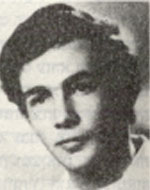Feinstein, Moshe-Shmuel
Moshe-Shmuel (Moshele), son of Rachel and Isaac, was born on the 24th of Cheshvan 5712 (24.11.1951) in Petach Tikva. He studied at the “Ner Etzion” elementary school, then attended the Brenner School and the Arav School of Commerce in Petah Tikva. During his youth, he was a member of the Hanoar Haoved Vehalomed youth movement. Afterward, he began to play sports and joined the sports division of Hapoel Petah Tikva. His main interest was running, and in many competitions, he won first place; And this is evidenced by the many certificates of excellence awarded to him. Moshe-Shmuel often read and wrote. He read many books of thought and wrote articles and poems. In his articles, written in an easy and fluent style, in a simple and comprehensible language, he discusses the individual, helpless in the face of the elements. He also wrote a book for the study of the geography of Acre. He was particularly attracted to mathematics and even prepared to study at Tel Aviv University. In order to divert attention and find an outlet for tensions, he would shut himself up in his room, and draw, with pencil and oil paint. He had “golden hands”. He worked in framing, sketching machine parts, and devoted his spare time to cultivating the garden in his yard, planting grass and planting fruit trees. He knew how to combine the development of spirit and thought without ignoring the culture of the body. “You can not separate the two,” he used to say. Moshe-Shmuel had a long temper and was not angry. He was optimistic and cheerful, happy and smiling. He loved others, was sociable and loved by people, pleasant, conversational and willing to learn from averyone. His parents had a loyal and dedicated son, and he respected them very much.
.Moshe-Shmuel was drafted into the Israel Defense Forces in mid-November 1970 and volunteered to serve in the Armored Corps, and after completing his basic training he took part in a course for Centurion Tank and tank commander courses. He said: “I feel that I am contributing something to my country. His commander wrote: “He is a good comander, a responsible commander, a competent initiator, and he fulfilled his role properly, to the satisfaction of his commanders.” All his days in the army he tried not to worry his parents and often wrote letters home, in which he calmed his father and mother and told them nothing about the hard training and the difficult field life. During the Yom Kippur War, Moshe took part in the battle against the Syrians in the Golan Heights. In a battle that took place on Tel-Fars on October 6, 1973, a missile hit his tank and he was killed on the spot and was brought to rest in the Kiryat Shaul cemetery, leaving behind his parents and sister.
After his fall, he was promoted to the rank of sergeant. His friend Yaron established a sports team in his memory (the “Moshe Group”), which trains in long distances. In his article Moshe-Shmuel wrote: “Courage is the preservation of principles and ideals and the sacrifice of life for the sanctification of these principles and the ideas that man believes in.” Moshe’s father added: “It was like Moshele that we knew, no effort deterred him, he was respected and respected by all.
